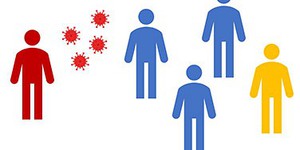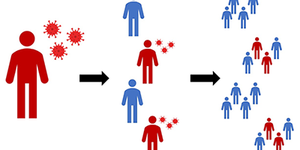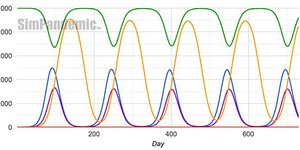Ninth Grade, Pandemics – COVID-19 Science Projects (5 results)
Humanity has faced pandemics since the beginning of time. The twentieth century saw multiple influenza pandemics, and now we are facing a COVID-19 pandemic caused by a coronavirus.
Coronaviruses are not new to humans or even to you. Coronaviruses are a family of viruses best identified by the crown-like spikes that cover their surface (corona is Latin for 'crown'). Coronaviruses cause upper-respiratory tract illnesses like the common cold and the 2003 SARS and 2012 MERS outbreaks. In the winter of 2019, a new coronavirus, now officially called SARS-CoV-2, emerged in Wuhan, China. The virus made the jump from animals to humans and causes a disease called COVID-19. For some people, often children and young adults, SARS-CoV-2 causes few or no symptoms. For others it can lead to severe lung damage and even death. The virus can be spread fairly easily, including by people who are infected but display no symptoms, and as a result, we are in the middle of a global pandemic, with nearly all countries in the world reporting an increasing number of infected individuals. Scientists and health professionals around the globe are working hard to rapidly learn more about this new coronavirus and the disease it causes and to prevent the spread of COVID-19.
|
Select a resource
Coding Projects
Sort by
|
Scientists recently found that some small drugs can stop infection by the deadly Ebola virus in
its tracks. Lab researchers found that these drugs bind to a protein that the Ebola virus uses to enter
our cells, and this is how infection is prevented. However, this also means that the bound protein no
longer functions in our cells. How might these drugs accidentally disrupt important biological processes
in our bodies? What other proteins might these drugs bind to? In this science project,…
Read more
Stopping a viral outbreak like COVID-19 takes more than luck, it takes public health tools. Vaccines are considered to be one of the best public health tools, which is why there is often a rush to develop good vaccines for newly discovered viruses, particularly those that have the potential to infect lots of people. Recent examples include COVID-19, Zika virus, and Ebola. If enough people are vaccinated, an effective vaccine can help stop outbreaks or even eradicate (completely get rid of) a…
Read more
New
Have you ever walked next to your favorite ocean, lake, or creek and seen plastic waste everywhere? Have you ever thought about how much plastic breaks down into microplastics and pollutes waterways? Scientists are coming up with new ways to remove these microplastics from our waterways, and now you can test them out for yourself at home.
Read more
One strategy you may have heard suggested for dealing with the COVID-19 epidemic is to let nature take its course and let COVID-19 infect enough of the population for us to reach the herd immunity threshold. Does this make sense as a public health strategy? You can explore this question scientifically using SimPandemic, a free online tool for modeling infectious disease outbreaks.
Before you begin, you will need to know a bit about herd immunity. Herd immunity, sometimes called community…
Read more
Even during a global pandemic like COVID-19, there are differences in how the epidemic unfolds within communities. Some communities see early, large waves of infected individuals, while others see smaller numbers of infections over a longer period of time, and others may not appear to have an epidemic at all. Could R₀ (pronounced R naught), account for some of this variation?
R₀, the basic reproduction number of a disease, quantifies how many people, on average, an infected…
Read more
"Flu season" is something we deal with every winter. Cyclical or seasonal outbreaks of an infectious disease can occur for a variety of reasons, such as seasonal changes in host behavior (for example, more people staying indoors), the seasonal abundance of disease carriers (for example, mosquitos), and many others.
Another factor that can play a role in cyclical outbreaks occurs when the natural immunity to a disease has a short duration. This enables each individual in the population to…
Read more
|











